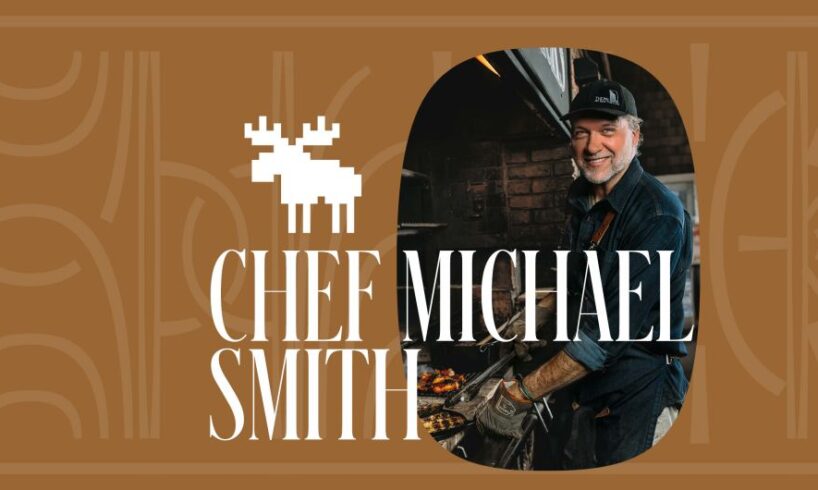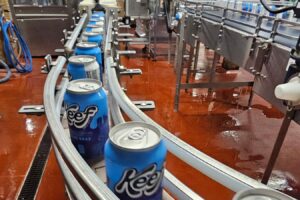
“Eh, we’re humble Canadians,” is how chef Michael Smith sums up the response from Prince Edward Island’s fishermen when he first began raving about their bluefin tuna catch. The American-born chef has been to Sweden, Tanzania and everywhere in between — and he genuinely believes Canada’s tiniest province has some of the world’s most delicious foods.
But, he says, it took him a while to convince the farmers, fishers and others who harvested its bounty of how special it was. He first landed on the island 35 years ago, and since then has made it his life’s work to persuade them.
“Sometimes we need an outside perspective to see our very best,” Smith says. “Changing people’s minds on the interesting value of what’s around me here on Prince Edward Island has instinctively been a part of my approach here for 35 years.”
Today, Smith and his wife own The Inn at Bay Fortune, where he landed as a young cook all those years ago. Its menu is highly Island-centric, featuring local catch, food grown on the onsite farm and treats picked wild from the land around it. “We’re one of just a handful of restaurants in North America with a full-time forager,” Smith says. Both his latest TV show, Chef on Fire, and cookbook, Wood, Fire & Smoke, celebrate another passion he gets to practice at the inn: cooking over an open flame.
Here’s what Smith had to share about his relationship with the natural world when he sat down to take our Moose Questionnaire.
This interview has been edited and condensed for length and clarity.
What’s the most awe-inspiring natural sight you’ve witnessed between the Pacific, Atlantic, 49th parallel and Hudson Bay, i.e. Canada?
I think just getting out on the land around me, on Prince Edward Island. I’ve had the opportunity to travel Canada. I’ve seen the mountains. I’ve seen the Prairies. I stood in the Prairies for the first time and felt like the weight of the continent was on my shoulders in this incredibly visceral way. But I come home, and time and time again, it’s Prince Edward Island. It’s those first glimpses as you dip below the flowers of the quilt — the patchwork quilt of the island. I know this island. I know it inside and out. So when I see it at a distance, I see all that time spent exploring every little corner around me. For me, awe-inspiring is not just this thing that you look at from a distance.
What’s the most awe-inspiring natural site you’ve witnessed outside of Canada?
New Zealand, Tasmania and the Southern Ocean. That feeling of sailing out of Hobart, Tasmania, heading into the great unknown. It’s the only place on the planet where the wind blows unimpeded, completely around the globe. That was pretty awe-inspiring.
“I come home, and time and time again, it’s Prince Edward Island.” Though Smith has travelled the world, at the end of the day, P.E.I. and its food, people and landscapes will always have his heart. Photo: Mark Spowart / The Canadian Press
Think of three iconic Canadian animals. Choose one each to kiss, marry and kill.
Golly. Well, I guess I would kiss a beaver, marry a fox and kill a bluefin tuna to celebrate.
Name a person or a group doing something meaningful for the environment that everyone should know about.
The good people at the Souris watershed group, the advocacy group for the watersheds in my community. Any of the small advocacy groups that exist around all of us in every community in Canada. They’re not always the big ones that are all well-funded and have a presence. They tend to be just good people that are genuinely concerned with a particular part of the environment around them. Here in eastern Prince Edward Island, the watershed folks are just so committed, and they’ve done such good work. They’ve restored so many of the streams around us and natural habitats. It’s just a joy to see that kind of understanding and connection with a shared environment.
Name one person who could significantly help mitigate the climate crisis if they wanted to.
Hmm, all of us? Our politicians. Everyone. I mean, that’s low-hanging fruit. We all need to do a better job. This idea that somebody else needs to do a better job is where we get stuck and nothing gets done. Every one of us needs to take personal responsibility.
Outdoor cats, yes or no?
One of the four. Coco’s outdoor, but Nimbus and Delphine and Aurora stay inside. Coco’s nine years old and she always went out, so now it’s like, “Oh, go on.” She comes back, and she leaves us little treasures by the door. She seems to do just fine out there.
Tell us about a time you changed your mind about something, environmental or otherwise.
I’ve changed my mind on organic. Once upon a time, [I saw it as] a shining light on the hill, and now I understand it as barely a starting line. It’s a word, a label. It’s regulated. I don’t trust it, and instead, advocate for what we do on our farm every single day. The culinary farm at The Inn on Bay Fortune is legendary for our sustainable, regenerative agriculture. We’re 10 years in and it’s just crazy how alive our soil is.
When have you tried to change someone else’s mind about something, environmental or otherwise?
I think helping artisan producers around me understand their role in a global economy. I’m not taking credit, but I was very much a part of helping, for instance, local fishermen understand the real value of a bluefin tuna and how they might change their practices to accentuate that value. And other fishery stories. All of them from this place of, “Eh, we’re humble Canadians”: sometimes we need an outside perspective to see our very best. Changing people’s minds on the interesting value of what’s around me here on Prince Edward Island I think has instinctively been a part of my approach here for 35 years.
Atlantic bluefin tuna can measure over three metres in length, and the largest one ever caught and recorded, off the coast of P.E.I., weighed 679 kilograms. The fish is highly prized for making sushi and sashimi in Japan. Photo: Robert F. Bukaty / The Associated Press
Rocky Mountains or Great Lakes?
You know, I love looking at the Rocky Mountains, but I’m a sailor at heart, so I’d take 30 knots out of the north any day.
Researchers at Yale University, the France-based Women’s Forum for the Economy and Society and other institutions have found women tend to be more concerned about climate change than men. Why do you think that is?
Because women seem to be just more connected with Mother Earth, and more open to the idea that there’s this thing at our feet that’s alive, that’s with us, and that maybe it’s not just something we should be getting some benefit out of. I mean, obviously it’s a loaded question, and there’s a bunch of different ways I could answer it, but I do believe, through my own personal experience, that women in our society often have an easier time expressing their creativity and their empathy.
If you could dip a toe off Canada’s coastline, which ocean would it be in?
Well, I’ve swum in the Pacific, I’ve swum all over the Atlantic, but I’ve never swum in the Arctic. I guess I would go with a nice raging bonfire on the shore ready to rip and then a quick plunge in the Arctic.
What is the farthest north that you’ve ever been? And what did you do there?
I’ve been to Iqaluit, here in Canada, and I’ve been a little bit farther north in Sweden.
In Iqaluit, I spent some time with Indigenous communities, looking at food traditions and how they might use those in a tourism sense and develop authentic products to share with the world. Iqaluit’s a pretty fascinating place. For me it always feels a bit like just scratching the surface, coming in and out over a few days. A week or so here or there really isn’t living or feeling it, but it is certainly among the coolest places I’ve ever been on planet Earth.
Smith has spent time in the North, in Iqaluit, and would opt for a plunge in the Arctic Ocean given a choice of waters to dip in. Photo: Elaine Anselmi
What is a beautiful or useful thing you’ve owned for a really long time?
My Joy of Cooking, a cookbook that I’ve had for 40 years. It’s bound now with duct tape. It’s stuffed with notes and ideas and postcards and random bits and bobs from a long cooking career. It’s got every bit of the how, the why. It’s something special. It’s a book I think about a lot when I write my own books and try to emulate the storytelling of it.
What’s one way that you interact with the natural world on a daily basis?
I’m blessed to interact with the natural world on a daily basis. I’m blessed to be surrounded by a team of people that interact daily through our culinary farm — how we connect it to our kitchen, how our cooks participate daily on the farm, the foraging that we do. I’ve already been down this morning to a stream nearby, to gather the day’s watercress for our salad bowl tonight. That connection to the land and to the environment grounds me, and I know it grounds the people around me and makes us the best versions of ourselves.
Who in your life has had the biggest impact on your connection to nature?
I think my mom really gave me the “get up and go, get outside.” All of that time spent running wild as a kid in the woods, making sailboats on the lake and stuff — every bit of that made me the man I am. [It was] her love of nature. My mom, for sure.
Smith is passionate about sustainability and regenerative agriculture, valuing daily practices over labels like “organic.” The farm at The Inn at Bay Fortune is teeming with life. Photo: Marty Clemens / The Narwhal
Whose relationship with nature would you like to have an impact on?
My kids. And all the young chefs I work with. [I’d like to help] them connect meaningfully to the environment here on Prince Edward Island and see the stories behind our ingredients, and go to sea for a day and fish some lobster, and get in a boat and go get oysters and meet every farmer in sight … That’s what I hope to do.
If you could ask one person, alive or dead, their thoughts on climate change, who would it be?
I think I would want to go back in time and ask somebody, like, “What the fuck, dude, why weren’t you paying attention and why didn’t you take action?” In the last 100 years all of this was known, all of this was seen, and it was just that sort of Victorian ethos of, “More and more and more for us, us, us — damn the engines, full speed ahead.” Here we are, all these years later, and look at us now.
Smoked salmon or maple syrup?
Oh, smoked salmon all the way! Just before we started chatting, I lit my smokehouse for the day. I chose applewood from our property. I’m smoking a salmon, I believe, from Nova Scotia. That is as sustainable as it could possibly be. [But I also] love my maple syrup. I often cure salmon with maple syrup.
Would you rather be invited to Victoria and David Beckham’s Muskoka cottage, or Harry and Meghan Sussex’s B.C. escape?
Neither. I would go with, “Hey, come see my joint,” and whoever comes, there’s my pick.
Camping, yes or no?
Absolutely. Camp, camp, camp. Get outside. Stay.
Enjoying the Moose Questionnaire? Read more from the series here.





